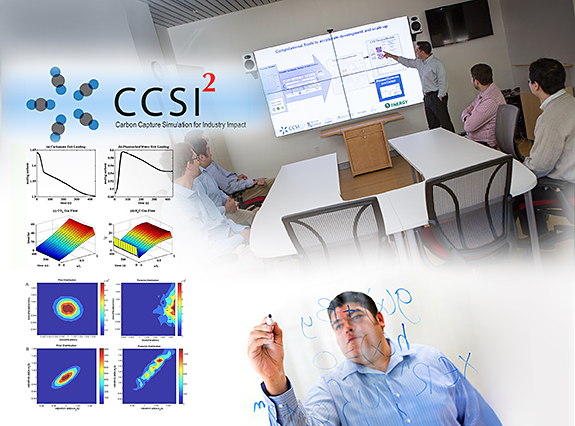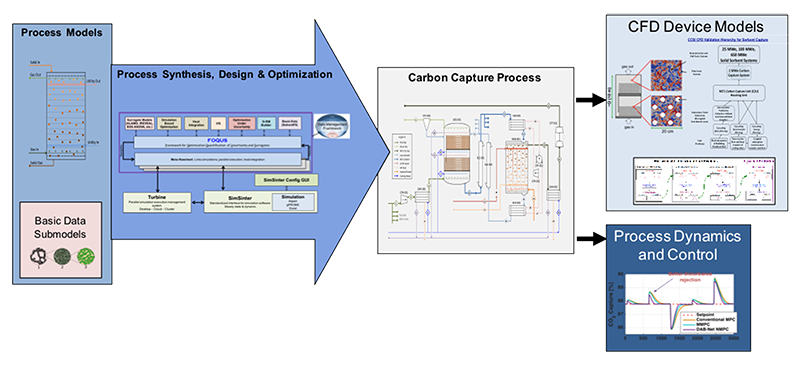CARBON CAPTURE SIMULATION FOR INDUSTRY IMPACT (CCSI2)
Background
 Near-term and large-scale reduction of carbon dioxide (CO2) emissions from fossil-based electricity sources is critical for mitigating climate change. The Carbon Capture Simulation for Industry Impact (CCSI2) project is focused on developing a fundamental understanding of CO2 capture technology, which will reduce those emissions. CCSI2 fully leverages an R&D 100 Award-winning computational package called the Carbon Capture Simulation Initiative (CCSI) Toolset. This Toolset was created to guide and inform Carbon Capture research and development (R&D), which is now the priority mission of CCSI2. The CCSI Toolset provides end users in industry with a comprehensive, integrated suite of scientifically validated models, with uncertainty quantification, optimization, risk analysis and decision making capabilities. The CCSI Toolset incorporates commercial and open-source software currently in use by industry and is also developing new software tools as necessary to fill technology gaps identified during execution of the project. Using the Toolset, CCSI2 collaborates with industrial, academic, and government partners to disseminate a rigorously quantified understanding of CO2 capture systems, manage risk and reduce the barriers to technology commercialization. The results are well-informed, accelerated technology transfer processes for timely implementation of technologies that benefit the world.
Near-term and large-scale reduction of carbon dioxide (CO2) emissions from fossil-based electricity sources is critical for mitigating climate change. The Carbon Capture Simulation for Industry Impact (CCSI2) project is focused on developing a fundamental understanding of CO2 capture technology, which will reduce those emissions. CCSI2 fully leverages an R&D 100 Award-winning computational package called the Carbon Capture Simulation Initiative (CCSI) Toolset. This Toolset was created to guide and inform Carbon Capture research and development (R&D), which is now the priority mission of CCSI2. The CCSI Toolset provides end users in industry with a comprehensive, integrated suite of scientifically validated models, with uncertainty quantification, optimization, risk analysis and decision making capabilities. The CCSI Toolset incorporates commercial and open-source software currently in use by industry and is also developing new software tools as necessary to fill technology gaps identified during execution of the project. Using the Toolset, CCSI2 collaborates with industrial, academic, and government partners to disseminate a rigorously quantified understanding of CO2 capture systems, manage risk and reduce the barriers to technology commercialization. The results are well-informed, accelerated technology transfer processes for timely implementation of technologies that benefit the world.
Project Description
CCSI2 is led by the National Energy Technology Laboratory (NETL), partnering with Lawrence Livermore National Laboratory (LLNL), Lawrence Berkeley National Laboratory (LBNL), Los Alamos National Laboratory (LANL), Pacific Northwest National Laboratory (PNNL), West Virginia University, and the University of Texas at Austin.
CCSI2 develops, validates, and applies advanced computational techniques for technology simulation, optimization, uncertainty quantification (UQ), and process control. Computational products are consolidated in the Carbon Capture Simulation Initiative (CCSI) Toolset software for developing rigorous understanding of CO2 capture technologies that enable efficient R&D. CCSI2 develops a detailed multi-scale understanding of the most effective pathways to minimize the cost to capture CO2. In FY17, CCSI2 directly supported seven projects in the Capture Program portfolio, while also providing industry-wide benefit by developing a general Design of Experiments framework that optimizes large- and small-scale test programs, as well as highly accurate benchmark CO2 solvent system modeling tools.
The primary goal of CCSI2 is to provide a fundamental and interdependent understanding of CO2 capture material-, device-, and system-level performance leading to more informed R&D guidance on CO2 capture technology development and reduced risks during commercialization. To achieve this goal, CCSI2 will:
- Provide R&D support that reduces risk and increases rate of CO2 capture technology commercialization.
- Generate accurate understanding and quantified uncertainty in CO2 capture system performance.
- Continue to validate, apply, and disseminate the CCSI Computational Toolset.

Project Benefits
CCSI2 is focused on simultaneously accelerating and de-risking R&D of CO2 capture technologies. Efforts in CCSI2 reduce the timeline and cost to commercialize technologies capable of cost-effectively achieving deep CO2 reduction from the fossil fuel power generation industry. Rooted in mathematical optimization frameworks, the computational methods employed by CCSI2 ensure the best operation, configuration, and minimized costs for low-carbon, fossil fuel-generated electricity.
Accomplishments/Successes
CCSI2 is currently developing a standard solvent-based CO2 capture system modeling framework with fundamental multi-hierarchical characterization that will be used by the international CO2 capture industry to inform technology testing and development.
Leveraging this fundamental modeling approach, a general framework for optimal steady state and dynamic design of experiments is being developed to streamline small- and large-scale testing requirements for most efficient and informative experimental data generation. This approach simultaneously improves model uncertainty and maximizes impact of test programs at all scales and technology readiness levels.
CCSI2 is performing multi-scale optimization of several CO2 capture systems under development by the Fossil Energy Carbon Capture Program. Projects include: ION Engineering – Low-Aqueous Solvent-based CO2 Capture; University of Texas at Austin–Advanced Flash CO2 Regeneration; LLNL – (1) Micro-Encapsulated CO2 Sorbent (MECS) and (2) Device-Scale Advanced Manufacturing; University of Kentucky – CO2 Capture Pilot Process Control; LBNL – Metal Organic Frameworks (MOFs); and PNNL – Low-Aqueous Solvents.
References




 Near-term and large-scale reduction of carbon dioxide (CO2) emissions from fossil-based electricity sources is critical for mitigating climate change. The Carbon Capture Simulation for Industry Impact (CCSI2) project is focused on developing a fundamental understanding of CO2 capture technology, which will reduce those emissions. CCSI2 fully leverages an R&D 100 Award-winning computational package called the Carbon Capture Simulation Initiative (CCSI) Toolset. This Toolset was created to guide and inform Carbon Capture research and development (R&D), which is now the priority mission of CCSI2. The CCSI Toolset provides end users in industry with a comprehensive, integrated suite of scientifically validated models, with uncertainty quantification, optimization, risk analysis and decision making capabilities. The CCSI Toolset incorporates commercial and open-source software currently in use by industry and is also developing new software tools as necessary to fill technology gaps identified during execution of the project. Using the Toolset, CCSI2 collaborates with industrial, academic, and government partners to disseminate a rigorously quantified understanding of CO2 capture systems, manage risk and reduce the barriers to technology commercialization. The results are well-informed, accelerated technology transfer processes for timely implementation of technologies that benefit the world.
Near-term and large-scale reduction of carbon dioxide (CO2) emissions from fossil-based electricity sources is critical for mitigating climate change. The Carbon Capture Simulation for Industry Impact (CCSI2) project is focused on developing a fundamental understanding of CO2 capture technology, which will reduce those emissions. CCSI2 fully leverages an R&D 100 Award-winning computational package called the Carbon Capture Simulation Initiative (CCSI) Toolset. This Toolset was created to guide and inform Carbon Capture research and development (R&D), which is now the priority mission of CCSI2. The CCSI Toolset provides end users in industry with a comprehensive, integrated suite of scientifically validated models, with uncertainty quantification, optimization, risk analysis and decision making capabilities. The CCSI Toolset incorporates commercial and open-source software currently in use by industry and is also developing new software tools as necessary to fill technology gaps identified during execution of the project. Using the Toolset, CCSI2 collaborates with industrial, academic, and government partners to disseminate a rigorously quantified understanding of CO2 capture systems, manage risk and reduce the barriers to technology commercialization. The results are well-informed, accelerated technology transfer processes for timely implementation of technologies that benefit the world.